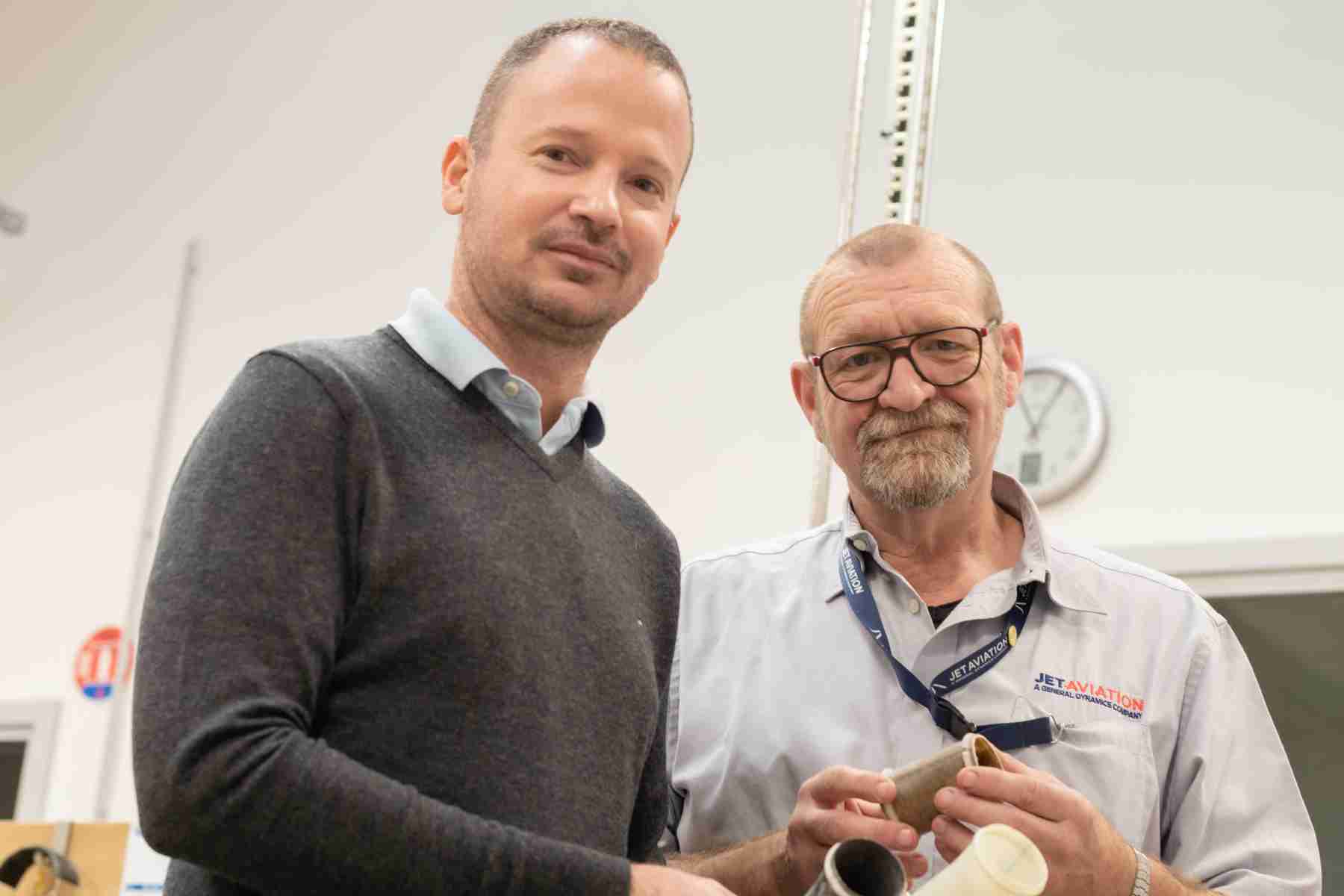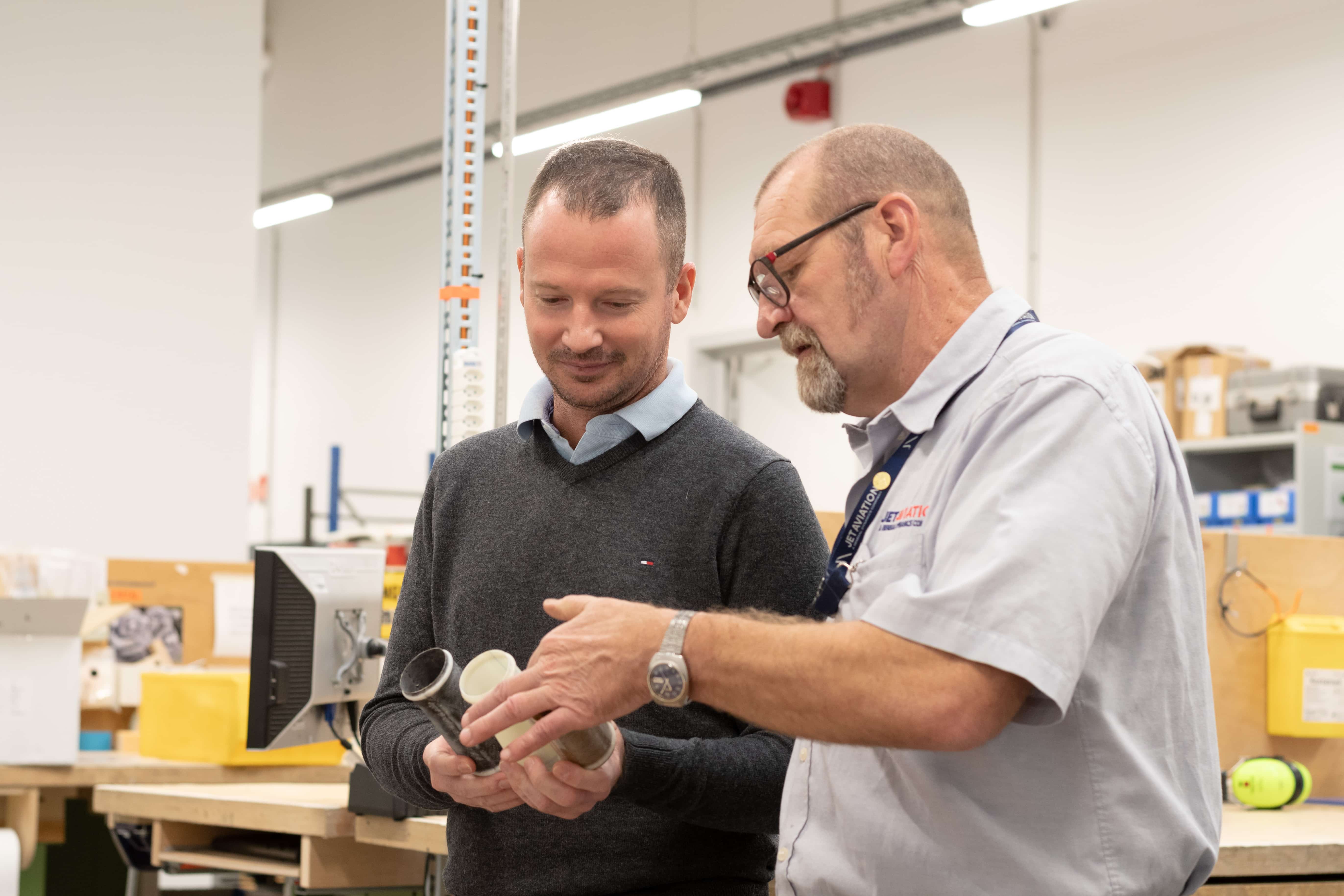In Conversation with Eco-Design Engineer Michael Benson

Over the past years, sustainability has become an important topic across many industries. As a company, we are committed to enabling our customers to make more sustainable choices at every stage of aircraft ownership, from engineering and project management to more sustainable materials and processes in design and production; from providing access to SAF, to reducing single use plastic and introducing electric charging and solar panels at our facilities.
One of our intiatives this year has been the introduction of a bio resin in the production of non-structural composite parts. The resin is produced from up to 25% plant origin biological sources and can be sourced local to the Basel facility, reducing the overall environmental impact when compared to traditional epoxy resin.
We spoke with Michael Benson, our Basel-based Eco-Design Engineer to understand more about how we can offer customers more sustainable solutions throughout the completions process and the potential that using bio-sourced materials can offer in our industry and beyond.
Hi Michael, can you start by telling us a bit about yourself and how you became an eco-design engineer?
I have been passionate about water sports (surfing, windsurfing) since my childhood. I grew up in the French Caribbean, precisely in Guadeloupe, spending a lot of time in the water.
Beyond the sport itself, I was delighted to be able to practice it in such a unique eco-environment, surrounded by crystal clear water and amazing sea flora. Because of coral reef, I was sometimes breaking my boards, and this is where I started to learn about composite materials, through the multiple repairs I undertook, which led me to pursue studies in this field and I became a materials engineer in 2006.
At the early stage of my career, eco-design engineering didn’t really exist, but somehow deep inside, I knew that it was the job I wanted to do every day. So, I went back to school in 2009 and obtained a Master’s degree in Environment, which marked the beginning of my career as eco-design engineer.
What does Sustainability mean to you?
Sustainability is about balancing our needs with the limited resources available on our planet, while developing resources for future use and ultimately, leaving behind a better world for future generations. Sustainability has also become a key topic in the Aerospace industry. Over the recent years, mindsets have started to shift, and more and more companies have understood the need of more sustainable approaches in their daily operations.
Many definitions can be found to describe what sustainability is, but to simplify, it can be perceived as a path to sustain life and protect our planet.
Why is it so important?
Delivering a sustainable future and reducing our carbon footprint without compromising on our performance is a challenge. But I’m convinced that this is the way forward. Our world is still highly dependent on fossil fuels, but renewable bio-materials and innovative new processes and technologies could be a great step-forward.

How is Jet progressing with this topic (from an eco-design engineer perspective)?
(Laughs) The start of my career here at Jet Aviation has been quite intense. Eco Design was not really an integrated part of our engineering and product mindset. As this topic was new, I could feel some nervousness to change the way we work, and the materials we use. We have hundreds of talented and highly experienced craftsmen at Jet Aviation, who know everything about how to craft cabin interior safely and efficiently. To persuade them that there could be a new way of doing this, which would be as effective – if not more so – and bring additional benefits, was not easy. But the new materials are both light-weight, solid and pass safety tests. As they saw the efficacy, more and more people became excited about the potential of biomaterials and bio-resins in composites.
Several years have passed, and I am extremely proud of the journey we’ve made. We are still at the beginning, but I am convinced that with the help of my colleagues we will be able to offer our customers even more sustainable solutions for their VVIP interiors.
What are you the most proud of?
From a composite point of view: the use, and implementation of a new bio-resin in our cabins, as the first step of our journey towards using more sustainable materials. We also continue to explore the possibilities of using new composites. In parallel, we have also managed to reduce the weight (by 30-35%) of our air conditioning and air ventilation parts: weight reduction means energy saving and a reduced carbon footprint.
Any current projects related to sustainability?
At the moment, I am very focused on R&D and innovation and more specifically in the implementation of sustainable materials across our activities. We have a number of possible application projects in the pipeline and recyclability calculations and life cycle assessment (e.g carbon footprint) would need to be performed so we are ready when they are.
Tell us about the next steps.
The implementation of new sustainable materials is my priority, and we are on the right path. Weight reduction is of course very important across all of our completion projects.
As well as being lightweight, sustainable materials can also offer great acoustic and vibration damping capabilities, and so have great potential to support our work in this area.
How do you keep up to date with the evolutions in sustainability?
Sustainability is contagious. Many colleagues now always keep an eye open for me when it comes to new products, processes, tools or equipment being introduced onto the market. I also stay in close contact with my former colleagues, or business partners, based around the globe and operating in different industries so I always remain at the forefront of new ideas and regulations.
During my spare time, I monitor all topics related to eco-design and sustainable materials regularly.
I wanted to finish this interview by thanking all my colleagues and the leadership team for their trust and for enabling me to explore this new path towards a more sustainable industry. Without your support we wouldn’t have been able to achieve all those milestones so far.